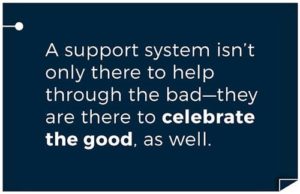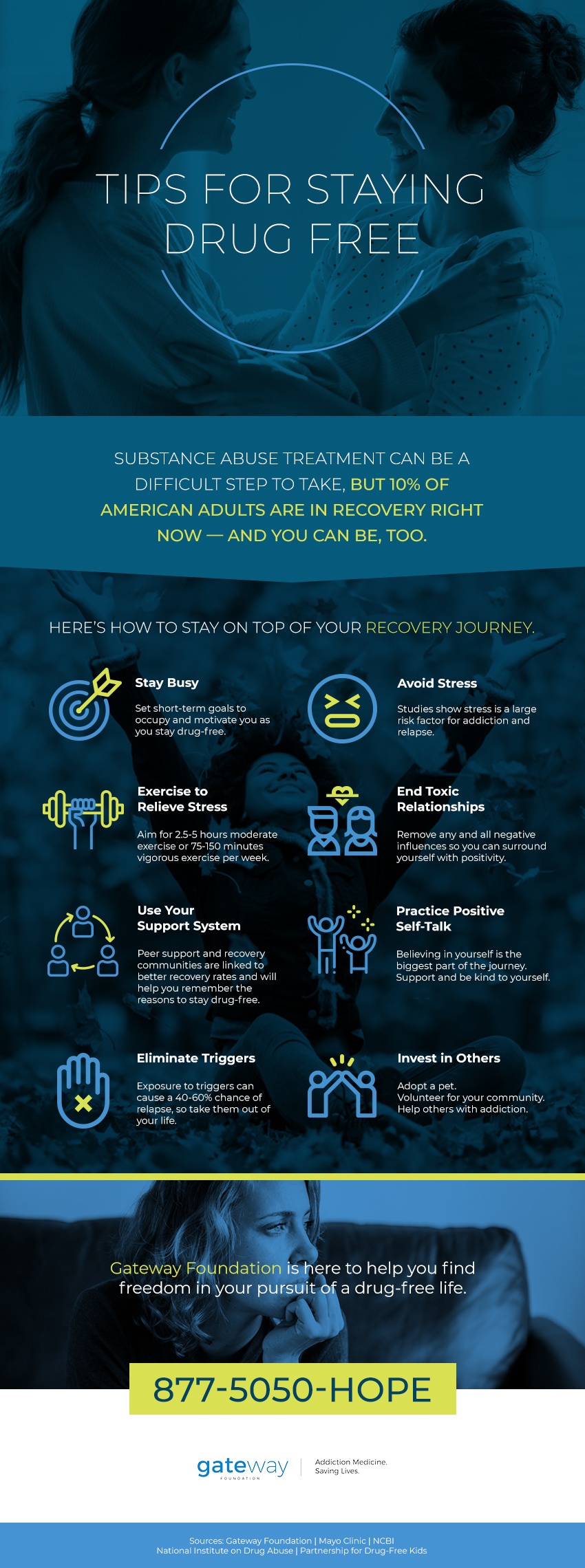- Jun 23
- Addiction Recovery AlumniDrug Addiction TreatmentPreventionRecovery
Completing treatment and returning to everyday life might seem like the most difficult thing you’ve ever done, but right now — as you are reading this — 10% of Americans are one some stage of their recovery journey. You can join them. As challenging as it may be for those in the beginning stages of recovery, there are some steps that you can take to ensure that your transition is as smooth as possible. Part of that journey includes attending outpatient treatments, aftercare and becoming involved in support groups, but that is only a portion of the journey. Here are some tips to help you stay drug-free and healthy during your transformative recovery journey.
 Tips for Staying Drug-Free
Tips for Staying Drug-Free
1. Learn to Set SMART Goals
Setting goals can help you stay drug-free, but if you set broad or expansive goals, they become more difficult to achieve and can cause more harm than good. With that in mind, remember the acronym SMARTwhen you’re setting goals. SMART stands for:
- Specific — Set a targeted goal that you can achieve rather than a broad one that you’re working toward.
- Measurable — Set a goal with progress points that you can measure. Don’t rely on arbitrary statements, but on actual data.
- Achievable — Make sure that this is a goal that you can achieve. Don’t set your goal to walk on the moon if you’re not healthy enough to pass an astronaut physical.
- Realistic — Don’t shoot for the stars with your goal setting. Stay firmly grounded here on Earth, especially when you’re setting your goals.
- Timely — Give yourself a specific time limit to complete your goal. Make sure it adheres to the other four letters of the acronym.
Setting SMART goals gives you the tools you need to set goals that will motivate you to stay drug-free instead of stressing you out and serving as a relapse trigger.
2. Build Habits to Stay Busy
When you repeat a task over and over again, you start to create a habit — something that you can do without really thinking about it. Some habits are good, like brushing our teeth or exercising, while others — like drug use or smoking — are bad. Whether you’re forming good or bad habits, what you’re doing is rewiring your brain. Repetitive tasks create new pathways in your brain and become permanent. That’s why it’s so difficult to break bad habits. You literally have to rewire your brain to break those habits.
Habits all have the same four stages: you receive or encounter a habit cue, you experience a craving, you respond to that craving, and you receive a reward. Does that sound familiar? If so, it’s because addiction is very similar which is why it can be so hard to make your way through recovery. Learn how to build good habits that will override your bad ones. It could be as simple as going for a run or lifting weights when you feel the craving for one of your bad habits. Maybe you need to be alone, maybe you need to call on your support system. Whatever you need to do, building habits can help you stay drug-free during your recovery jorney.

3. Sweat it out.
Try to squeeze in at least 30 minutes of exercise per day. According to a study at Mayo Clinic, exercise helps reduce stress, improves mild-to-moderate depression and anxiety, improves sleep and boosts mood. Those new to exercise shouldn’t feel intimidated. The study suggests a simple brisk walk is enough to reap these benefits.
4. Cut out toxic relationships.
Take responsibility for recovery by being honest with unhealthy friendships or romances. Ask for their respect in lifestyle changes, like the need for space. Ending it doesn’t mean the other person is “bad.” This is not assigning blame—only maintaining well-being.
5. Utilize support systems.
Support networks may include family, friends, colleagues, recovery meeting participants, sponsors or therapists. Verbalizing feelings, even when it’s uncomfortable, can help conceptualize and take responsibility for the next steps necessary. Joining and becoming engaged in a recovery community is beneficial as well, as it allows relationships to develop between people who have shared experiences and understand each other. Also remember that a support system isn’t only there to help through the bad—they are there to celebrate the good, as well.
6. Practice positive self talk.
Celebrate your victories instead of focusing on perceived failures. You’ve already taken the incredibly brave step to walk through addiction recovery. No matter where you are in your journey, you’re already a champion. When you feel tempted to criticize yourself, berate former mistakes or numb negative emotions with a substance, focus on employing positive self-talk.
Think about the things you’re proud of and any experiences where you were able to stay strong in your sobriety. Make a list of attributes you like about yourself or others have complimented you for. Surround yourself with positive statements and things that inspire and excite you.
7. Adopt a pet.
A furry or fluffy companion can help ease stress, anxiety and loneliness in an emotionally healthy way. Emotional support animals are shown to have a host of health benefits, including boosting your feel-good hormones and lowering your blood pressure with their calming nature. Caring for a pet also provides you with extra everyday responsibility and motivation to stay drug-free.
8. Walk away from stress.
Stress is often one of the factors that push former substance users to relapse. Some level of stress is unavoidable, but there are others that we can pluck right out of our lives. Take a stress-free stance and, whenever possible, respectfully remove yourself from situations or people that bring anxiety. Learn the power of saying “no” to requests that will bring negative energy to your life, and pursue healthy opportunities that make you want to say “yes.”
9. Avoid temporary solutions.
Don’t train your body and mind to become accustomed to short-term feel-good measures. If you’re always pursuing a quick fix to solve any unhappiness, stress or discontent in your life, you may be more likely to turn to drugs as another one of those temporary solutions. Instead, pursue long-lasting and sustainable health in the form of hobbies, nutritious food, regular exercise, positive friendships and self-care habits.
10. Give back.
One of the best ways to stay drug-free is to give yourself as many reasons as possible to remain sober. Investing in others can be a very sustainable and fulfilling reason. Volunteer to spend your time and talent helping a cause you care about, or share your story and experiences with others who may be a step or two behind you in the addiction recovery process.
11. Get rid of triggers.
Everyone has their own triggers that tempt them to start using drugs again. Maybe it’s a particular person or group of people. Maybe it’s a time of year. Maybe it’s a place or type of environment. Be conscious of your triggers and take steps to avoid them.
This might be as simple as avoiding a certain location or asking for extra support during the holidays. However, you might also need to take more drastic measures, such as moving or letting go of former friendships. No matter how difficult it may be, addressing your triggers will help you stay drug-free in the long term.
When times get tough, remember this is a time of major change, and lessons and insights are being gained to use down the road.
For more tips for staying drug-free, call Gateway today at 877.505.4673.

 Tips for Staying Drug-Free
Tips for Staying Drug-Free
